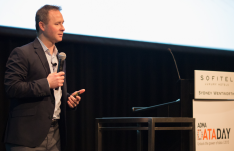Programmatic on the rise at Kelloggs but executive warns of risk to creativity
 Programmatic marketing now makes up more than half of Kellogg’s digital budget which itself is now on a par with its spend on more traditional forms of advertising, a senior company executive has revealed.
Programmatic marketing now makes up more than half of Kellogg’s digital budget which itself is now on a par with its spend on more traditional forms of advertising, a senior company executive has revealed.
But despite the increasing focus on digital, Aaron Fetters, director of KNA Insights and Analytics at Kellogg’s, said the term digital marketing is being phased out at its US head office.
Speaking at an Association of Data Driven Marketing and Advertising conference in Sydney this morning, Fetters said the term is redundant in a world where so many aspects of day to day life is digital.
“The expectation and environment of our consumers and of ourselves as marketers have absolutely changed,” he said. “That environment has changed so much that we are trying to remove the word digital marketing from our lexicon.
“It’s no longer about digital marketing. It’s about marketing in a digital marketplace. Consumers don’t live in a digital world or an offline world. They live in a digital marketplace.”
He later told Mumbrella: “Digital is a vague term. There is mobile, social, banners, videos content, native, so we try to think more in those terms and be in places that are most relevant.”
Fetters said Kellogg’s marketing budget is now evenly split between digital and traditional channels, with more than 50 per cent of its digital spend being ploughed into programmatic advertising.
While the US was the first market to adopt programmatic, Australia “is on the right path”, he said.
But he rejected it was a strategy designed to access the market at a cheaper cost.
“There was a time when there was the assumption we were going after the cheaper media. We said fundamentally no, that’s absolutely not what we are doing,” Fetters said. “We are looking for more effective advertising. Yes we want to be more efficient but we are willing to pay more to get better results.
“We’ve had great success. The US was the first market to adopt programmatic as a strategy, and there has been lots of learning. Australia is now on a great path and starting to invest more in that space.”
He added that programmatic is not “all about real time bidding”.
“Programmatic is the use of data and technology to better put your message in front of the most relevant consumer at the right time. That is how we look at it and evaluate it,” Fetters said. “The US programmatic budget is more than half the digital investment today but programmatic is a broader concept than people assume it to be. It encompasses everything from private exchange to the open exchange, it’s not all real time bidding.
“We say there is an ability to brand build….we are not doing so much of the direct response transactional type advertising, We are building brands and we have seen great success.”
Despite the raft of opportunities opening up to marketers through data mining, Fetters insisted that the fundamentals of marketing remained the same.
He told delegates at the Data Day conference there is an “unhealthy obsession with data” and stressed the continual need to create “great ideas”.
The Michigan-based executive later told Mumbrella: “It’s really important to say that the fundamentals of marketing have not changed We still need deep insights that lead to great creative ideas. That is vitally important. All the data in the world won’t help us be more effective if we don’t have those foundational components.
“There are brands doing some interesting things with data to inform and improve their creative process so there is a role for data in the creative process. They don’t need to be in conflict. ”
While denying that creativity has been lost, he admitted that risk remained if marketers focus too much on the analytics.
“We still have great examples of companies who are doing really cool creativity. Data gives us new ways to bring that creativity to life with consumers and to create great experiences. But sure, yes, there is a risk that if all you focus on is the numbers you lose the perspective of what was the insight was in the first place.”
Meanwhile, Fetters refused to be drawn on Kellogg’s Australia’s decision to withdraw from out of home advertising. He confirmed brands in the US continued to use OOH but said the strategy in Australia was a matter for the local business.
Steve Jones



